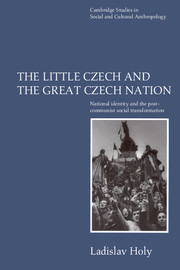 The Little Czech and the Great Czech Nation
The Little Czech and the Great Czech Nation The recent demise of socialism in Eastern and Central Europe has produced an avalanche of writing on various aspects of the socialist system. Unlike economists, political scientists, and sociologists, who have analysed the socio-economic organisation and political systems of the former socialist countries, the anthropologists who have done fieldwork in the region have concentrated on the description of the life experiences of people living in these countries, the ways in which they have accommodated to the reality of the socialist system, and the effects of such accommodation on their interpersonal relations. They have paid particular attention to the fact that in most socialist countries, ‘most of the time, most “ordinary people” simply took the system for granted, accommodated to it, and got on with their lives without joining either the Communist Party or a dissident group. In other words, they “muddled through”, just as people do in other kinds of society’ (Hann 1993: 11–12; see also Sampson 1984).
The anthropologists' effort to understand what it means to live in a socialist state has paralleled the interest of numerous Central European writers, playwrights, and other intellectuals, who have paid more attention to the effects of socialist reality on interpersonal relations than to the analysis of socialism as an economic and political system. Local intellectuals have viewed socialism first of all as a system which debased not only specifically Christian but also generally Western cultural values of moral rectitude by fostering ‘living a lie’, as the Czech playwright and now president of the Czech Republic Václav Havel expressed it (Havel et al. 1985).
To save this book to your Kindle, first ensure no-reply@cambridge.org is added to your Approved Personal Document E-mail List under your Personal Document Settings on the Manage Your Content and Devices page of your Amazon account. Then enter the ‘name’ part of your Kindle email address below. Find out more about saving to your Kindle.
Note you can select to save to either the @free.kindle.com or @kindle.com variations. ‘@free.kindle.com’ emails are free but can only be saved to your device when it is connected to wi-fi. ‘@kindle.com’ emails can be delivered even when you are not connected to wi-fi, but note that service fees apply.
Find out more about the Kindle Personal Document Service.
To save content items to your account, please confirm that you agree to abide by our usage policies. If this is the first time you use this feature, you will be asked to authorise Cambridge Core to connect with your account. Find out more about saving content to Dropbox.
To save content items to your account, please confirm that you agree to abide by our usage policies. If this is the first time you use this feature, you will be asked to authorise Cambridge Core to connect with your account. Find out more about saving content to Google Drive.